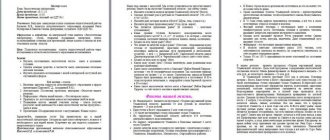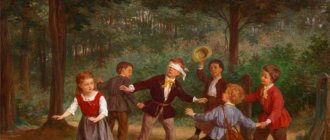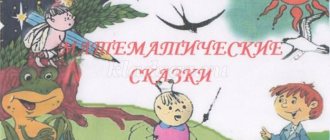Folk tales as a means of educating the moral qualities of preschool children
Through a fairy tale, fantasy, game, through the unique
Children's creativity is the sure way to a child's heart.
fairy tale, fantasy is the key with which
you can open these origins, and they will fill
life-giving keys...
V. A. Sukhomlinsky
The socio-economic transformations taking place in modern Russian society have significantly changed its socio-cultural life, affected the standard of living of the population, affected the peculiarities of the formation of the younger generation, and the alienation of children from educational institutions. The problem of the formation of moral qualities in preschool age is currently relevant, since the emerging value vacuum, lack of spirituality, caused by the alienation of a person from culture as a way of preserving and transmitting values, lead to a transformation of the understanding of good and evil in the younger generation and put society in danger of moral degradation. Ensuring the moral development and upbringing of the personality of a Russian citizen is a key task of modern state policy of the Russian Federation (A.L. Danilyuk, A.M. Kondakov, V.A. Tishkov). The problem of increasing the effectiveness of moral education of the younger generation, based on the unity of moral consciousness, behavior, feelings and experiences of children, their becoming subjects of moral development, has great social significance (L. I. Bozhovich, A. B. Zaporozhets, V. S. Mukhina, E. V. Subbotsky, V.D. Shadrikov).
The formation of moral qualities is a process aimed at the formation and development of a child’s holistic personality, and involves his formation towards the Motherland, society, team, people, work, his responsibilities and himself.
Preschool age is the initial and, therefore, extremely important stage in the process of assimilation of the mechanisms of moral behavior and the formation of moral qualities, and is a valuable period of development in which a child’s personality takes shape; behavior that complies with moral rules is formed, which is a necessary condition for the socialization of children. The development of the moral sphere in preschool age includes two aspects. One side is the development of feelings and will, the other is that the child gradually begins to understand the world around him and realizes his place in it, which gives rise to new types of motives of behavior, under the influence of which the child performs certain actions.
Based on the moral rules of behavior previously acquired by children (in the form of politeness, attention and sympathy for peers and adults, basic skills in providing assistance, friendly forms of communication, etc.), it is possible to form moral qualities in preschool children.
Preschool childhood is an important period in a child’s life, when a sense of one’s own capabilities, the need for independent activity, basic ideas about the world around us, good and evil in it, ideas about the family structure and native land are formed, as well as the development of moral qualities of the individual.
In the context of the transition to the new Federal State Educational Standards of preschool education, the main tasks of educating the moral qualities of the personality of preschool children have been identified:
− formation of the principles of patriotism and citizenship;
− formation of a humane attitude towards people and the environment;
− formation of spiritual and moral attitudes and a sense of belonging to the cultural heritage of one’s people;
− respect for one’s nation; understanding of one's national characteristics;
− formation of self-esteem as a representative of one’s people; respect for representatives of other nationalities;
− formation of positive, friendly, collective relationships; fostering a respectful attitude towards work.
Preschool age is the most important period of child development, which has independent significance. A.V. Zaporozhets, L.I. Bozhovich, N.M. Barinova, A.N. Leontyev designated preschool childhood as the period of the initial formation of personality, the development of personal mechanisms of behavior [12, p. 35].
A preschool child masters normative (play) activities and normative behavior. Based on mastery of the first ethical authorities and the development of arbitrariness of all mental processes, the intensive formation of the moral sphere of the individual is carried out. As scientists L. S. Vygotsky, D. B. Elkonin, L. I. Bozhovich, V. S. Mukhina, N. V. Melnikova, E. V. Subbotsky note, it is in preschool age that moral regulation begins to form [44, With. 70].
A child’s morality is associated with the internal motivation of his behavior, which allows the child to make the right moral choice (L. I. Bozhovich, M. V. Ilyina, V. S. Mukhina). In the process of moral education in direct communication and joint activities with adults, the child develops integrated personality traits - moral qualities, which, being fixed in the child’s moral experience, determine his moral actions, deeds and relationships [31, p. 59].
Thus, moral qualities are moral norms and principles that have become internal motives of behavior and determine its usual forms. Moral qualities act as stable elements of moral consciousness and behavior. Preschool age is sensitive for moral education, the development of moral qualities, moral position, and behavior. In preschool age, the moral sphere of the individual represents an integral unity and interaction of cognitive (moral consciousness), emotional (moral feelings and experiences) and behavioral (moral behavior and relationships) components, in which the system-forming role belongs to moral feelings. The basic concepts of the moral sphere are such concepts as: good-bad, possible-impossible, politeness-rudeness, truth-lies, compassion-indifference, tolerance-intolerance, responsiveness-callousness, generosity-greed, good-evil, mercy-cruelty.
Moral ideas formed in preschool childhood include ideas about the phenomena of social life, about people’s work, its social significance and collective nature, about patriotism and citizenship, about norms of behavior in a group of peers, why it is necessary to share toys, how to negotiate with each other , how to take care of younger ones, etc., about respectful attitude towards adults.
Folk tales are the oldest way of passing on life wisdom from generation to generation.
According to the scientific definition of V. A. Nikolaeva in literature, a folk tale is “an epic literary genre, a narrative about some magical or adventurous events, which has a clear structure: beginning, middle and ending” [47, p. 55]
Folk tales are oral folk art: a prosaic oral story about fictitious events in the folklore of different peoples [23]. These tales reflect national ideals. But fairy tales were written not only for entertainment; in them people wanted to express their attitude to life. In folk tales we see faith in reason, goodness and justice, the triumph of truth over falsehood, the glorification of courage and bravery, disdain for stupidity, hatred of enemies or ridicule of them. A folk tale allows you to feel a connection with the past and provides an opportunity to join the origins of folk culture [21].
Folk tales provide rich material for the formation of moral qualities in children. V. A. Sukhomlinsky theoretically substantiated and confirmed in practice that “a fairy tale is inseparable from beauty, it contributes to the development of aesthetic feelings, without which nobility of the soul, heartfelt sensitivity to human misfortune, grief, and suffering are unthinkable. Thanks to a fairy tale, a child learns about the world not only with his mind, but also with his heart.” In his opinion, fairy tales are a fertile and irreplaceable source of instilling love for the Motherland. The main advantage of a fairy tale in the formation of moral qualities in preschool children is that, through the events in the fairy tale, children:
− moral qualities are acquired: good - evil, obedience - disobedience, agreement - enmity, hard work - laziness, selflessness - greed;
− the child becomes aware of the following basic moral qualities: conscientiousness and decency, selflessness and kindness, empathy and sympathy, patriotism;
− the child acquires moral norms: openness to goodness, a positive attitude of the child towards the world around him, towards other people and himself;
− children’s ability to distinguish good from bad in fairy tales and in life develops;
− children are taught mercy, the ability to give in, help each other and gratefully accept help;
− instills diligence, bringing the job started to the end, respecting the results of other people’s and one’s own work;
− aesthetic taste develops, the ability to see, appreciate and cherish beauty.
The content of a fairy tale is a condition for the formation of moral qualities in preschool children. They have a highly developed identification mechanism, that is, the process of emotionally uniting themselves with another person, character and appropriating his norms, values, and models as their own. Perceiving a fairy tale, the child compares himself with a fairy-tale hero, which allows him to feel, understand and realize his mistakes, mistakes, or, conversely, the correctness of his actions [30].
Thanks to a fairy tale, children begin to comprehend the most important truths of human life and develop the ability to show moral feelings (compassion, sympathy, empathy, etc.).
In order to identify the formation of the moral qualities of the personality of preschoolers, a study was conducted on the basis of MDOU No. 66 “Lebedushka” in the city of Volzhsky, Volgograd region, in which 24 preschoolers aged 4 to 5 years took part.
The study consisted of three stages: the first stage - ascertaining; the second stage is formative; the third stage is control.
The following methods were used in this work:
− “Conversation” technique, author A. O. Prokhorova. The goal is to identify the level of formation of the moral qualities of the personality of a senior preschooler
− “Finish the story” technique, E. S. Evdokimova. Goal: identifying the level of formation of the moral qualities of the personality of a senior preschooler
− method “Diagnostics of the moral sphere of a preschool child”, N.V. Melnikova.
Purpose: to identify the level of formation of the moral qualities of the personality of an older preschooler. A study using the “Finish the Story” method by E. S. Evdokimova showed the following results, presented in Figure 1.
Rice. 1. The level of formation of moral qualities of a preschooler’s personality according to the “Finish the story” method, E. S. Evdokimova at the ascertaining stage
Having processed the results of the study, at the ascertaining stage we identified the following levels of formation of personal moral qualities in preschoolers.
A high level of development of personal moral qualities is observed in 13%, since children name a moral standard, correctly assess the behavior of children and motivate their assessment. The criterion of moral knowledge is characterized by knowledge and understanding of basic ethical concepts, moral norms, moral qualities of an individual, standards and rules of moral behavior and relationships; the idea of responsibility for one’s actions and actions. The criterion of moral relations is characterized by an adequate perception of reality, acceptance of oneself and others, sincere interest in another person, a fresh perception of the world with an emphasis on its positive aspects; attitude towards adults and peers based on kindness, responsiveness, sensitivity, tolerance, politeness and respect. The criterion of moral behavior is characterized by the ability to fulfill moral norms and requirements, to perform necessary, useful, approved actions; the ability to resist temptation and break these rules; the ability to correctly resolve moral dilemmas and make moral choices. The criterion of moral experience is characterized by the ability to trust one’s feelings and consider them as the basis for choosing behavior; when acting morally, experience positive feelings; when norms and rules are violated, experience feelings of shame, guilt, and a desire to change. The criteria are characterized by the unity and identical positive modality of all the above characteristics.
The average level of development of a person’s moral qualities is observed in 37%, since children name a moral standard, correctly assess the behavior of children, but do not motivate their assessment. The criterion of moral knowledge is characterized by knowledge and understanding of basic ethical concepts, moral norms, and moral qualities of the individual. The criterion of moral relations is characterized by an adequate perception of reality, acceptance of oneself and others, and sincere interest in another person. The criterion of moral behavior is characterized by the ability to fulfill moral norms and requirements, to perform necessary, useful, approved actions. The criterion of moral experience is characterized by the ability to trust one’s feelings and consider them as the basis for choosing behavior; When acting morally, experience positive feelings.
A low level of development of personal moral qualities is observed in 50%, since children evaluate children’s behavior in situations as positive or negative (right or wrong, good or bad), but the assessment is not motivated and a moral norm is not formulated. The criterion of moral knowledge is characterized by knowledge of basic moral norms. The criterion of moral relations is characterized by an inadequate perception of reality, acceptance of oneself and others. The criterion of moral behavior is characterized by non-compliance with moral norms and requirements. The criterion of moral experience is characterized by a low ability to trust one’s feelings and consider them as a basis for choosing behavior. The criteria indicate a gap between moral consciousness and behavior, attitudes and experiences.
Thus, according to the “Finish the story” method, E. S. Evdokimova, the overall level of formation of the moral qualities of a preschooler’s personality is low
A study using the method of “Diagnostics of the moral sphere of a preschool child”, N.V. Melnikova, showed the following results, presented in Figure 2.
Rice. 2. The level of formation of the moral qualities of a preschooler’s personality according to the “Diagnostics of the moral sphere of a preschooler” method, N.V. Melnikova at the ascertaining stage
Having processed the results of the study, at the ascertaining stage we identified the following levels of formation of moral personality traits in preschool children.
A high level of development of personal moral qualities is observed in 9%, since children experience satisfaction from good deeds and the approval of adults. They show responsiveness, empathy, kindness, and joy for others. Moral feelings encourage children to take active actions: help, show care, attention, calm, please. Children try to help, if someone is crying, they can promise to come with a friend and play; if someone in the company is upset because they lost a game, they explain that there is nothing to worry about; if a friend is offended by them, they will think about his feelings and what they can do in this situation. The sincerity of children's feelings and actions caused by them should be especially emphasized. Children demonstrate a meaningful attitude towards the moral content of their actions.
The average level of development of personal moral qualities is observed in 37%. since children experience satisfaction from good deeds and the approval of adults. They show responsiveness, kindness, and joy for others. Moral feelings encourage children to take active actions: help, attention, please. Children think about what could happen if someone cries; may refuse to provide the game; if someone in the company is upset because they lost a game, they explain that there is nothing wrong with that; if a friend is offended by them, they will prove to him that he is wrong. The sincerity of children's feelings and actions caused by them should be especially emphasized. Children demonstrate a meaningful attitude towards the moral content of their actions.
A low level of development of personal moral qualities is observed in 54%, since children experience satisfaction from shame, grief, and unpleasant experiences from their bad deed, from an adult’s remark, or dissatisfaction. They show kindness. Moral feelings do not encourage children to take active action. Children, if someone cries, do not react to it; may refuse to provide the game; if someone in the company is upset because they lost the game, they will offend this person with a word; if a friend is offended by them, they will be offended in return. It should be especially emphasized that the sincerity of children's feelings and actions caused by them.
Thus, according to the method of “Diagnostics of the moral sphere of a preschooler”, N.V. Melnikova, the general level of formation of the moral qualities of a preschooler’s personality is low.
Summary table of diagnostic results at the ascertaining stage. The methods are presented in Figure 3
At the ascertaining stage, the following results were obtained.
A high level of formation of moral qualities of a person is observed in 9%, an average level of formation of moral qualities of a person is observed in 37%. a low level of development of personal moral qualities is observed in 54%.
Rice. 3. Levels of formation of moral qualities of a person in a preschooler at the ascertaining stage
Thus, the children studied at the ascertaining stage of the study have a low level of formation of moral qualities of the individual, and therefore need to create psychological and pedagogical conditions for nurturing the moral qualities of the personality of older preschoolers through a folk tale.
The second stage is formative, which consists in creating psychological and pedagogical conditions for nurturing the moral qualities of the personality of preschool children through a folk tale.
To develop moral qualities in preschool children, we will propose a system of fairy tales, “The fairy tale is a lie, but there is a hint in it,” based on magical, social, and fairy tales about animals, in which the formation of moral qualities of an individual occurs.
O. Wilde’s first fairy tale, “The Star Boy,” instills in children attention to people, a careful and respectful attitude towards them. Forms moral qualities: empathy - sympathy, good - evil, obedience - disobedience, agreement - enmity, hard work - laziness, selflessness - greed, conscientiousness - decency. After reading the fairy tale, the children answered questions: why did he decide to drive away the beggar woman? Did he do the right thing? Who stood up for the woman? Why wasn’t the lumberjack’s children accepting the star boy? How did the boy's beauty return? The children took an active part in the discussion of the fairy tale. The children did not like the main character, they condemned him and said that it was impossible to do this, that you need to respect everyone around you, they understand where the hero did the right thing and where he did not.
The second fairy tale “Khavroshechka”. A good orphan suffers persecution from an evil stepmother, this becomes a source of suffering and misadventures. A fairy tale teaches a child to evaluate the deeds and actions of people in the light of the correct concepts of what is good and what is bad. The guys understand the unfair treatment and worry about the main character. While discussing the fairy tale they read, they correctly identify good and evil deeds.
The third fairy tale is “Cinderella”. The children were offered a game based on this fairy tale. Children choose their heroes, who they would like to be. During the game, they remembered the positive and negative heroes of the fairy tale, gave them characteristics describing their behavior and actions.
The fourth tale is “Porridge from an Axe.” At the beginning, as in the first lessons, the children were read a fairy tale and asked questions about it. “Porridge from an Axe” is an everyday fairy tale; it openly and clearly expresses the assessment: what is not moral, what is worthy of ridicule. Unlike the heroes of a fairy tale, here the poor achieve the triumph of justice without the help of miraculous helpers - only thanks to intelligence, dexterity, resourcefulness and even fortunate circumstances.
Fifth tale “The Tale of How Grandfather Nikolai Went to the Fair”
A theatricalization of the fairy tale was presented, in which children took part, solved riddles, and answered questions. The fairy tale teaches children to respect each other and adults. To instill in children mercy, a sense of compassion for others.
During the fairy tale system, the following moral qualities were formed: empathy - sympathy, honesty, good - evil, conscientiousness - decency, modesty, mercy, mutual assistance, mutual respect, openness to good, a child’s positive attitude towards the world around him, towards other people and himself .
The third stage, the control stage, consists of studying changes in the moral qualities of a preschooler’s personality. At this stage, a comparative analysis of the data obtained was carried out, the results of the study were summed up and conclusions were drawn.
A study using the method of the level of formation of moral qualities of a preschooler’s personality using the “Conversation” method, author A. O. Prokhorova in Figure 4.
Rice. 4. The level of formation of moral qualities of a preschooler’s personality according to the “Conversation” method, author A. O. Prokhorova (stating and control stages of the study)
Thus, according to the “Conversation” method (author A. O. Prokhorova), the general level of formation of the moral qualities of the personality of a senior preschooler is average. The results of the method changed as follows: the low level decreased by 37%, the average level increased by 17%, and the high level increased by 20%.
A study using the “Finish the story” method (author E. S. Evdokimova) showed the following results (Figure 5):
Rice. 5. The level of formation of moral qualities of a preschooler’s personality according to the “Finish the story” method, E. S. Evdokimova (stating and control stages of the study)
Thus, according to the “Finish the story” method, E. S. Evdokimov, the general level of formation of the moral qualities of a preschooler’s personality is average. The results according to the method changed as follows: the low level decreased by 33%, the average level increased by 17%, and the high level increased by 16%.
A study using the method of “Diagnostics of the moral sphere of a preschool child”, N.V. Melnikova, showed the following results, presented in Figure 6.
Rice. 6. The level of formation of the moral qualities of a preschooler’s personality according to the “Diagnostics of the moral sphere of a preschooler” method, N.V. Melnikova (stating and control stages of the study)
Thus, according to the method of “Diagnostics of the moral sphere of a preschooler”, N.V. Melnikova, the general level of formation of the moral qualities of the personality of an older preschooler is average. The results according to the method changed as follows: the low level decreased by 37%, the average level increased by 13%, and the high level increased by 24%.
At the ascertaining stage, the following results were obtained. A high level of formation of moral qualities of a person is observed in 9%, an average level of formation of moral qualities of a person is observed in 37%, a low level of formation of moral qualities of a person is observed in 54%. At the control stage the following results were obtained. A high level of formation of moral qualities of a person is observed in 33%, an average level of formation of moral qualities of a person is observed in 50%, a low level of formation of moral qualities of a person is observed in 17%.
Rice. 7. Levels of development of moral qualities of a preschooler’s personality according to the results of the study using all diagnostic methods (stating and control stage)
The results for all diagnostic methods (ascertaining and control stages) changed as follows: the low level decreased by 37%, the average level increased by 13%, and the high level increased by 24%.
Thus, at the control stage of the study, they have an average and high level of formation of moral qualities of the individual. During the study, the hypothesis put forward by us that the included folk tales contribute to the formation of the moral qualities of the personality of preschoolers was proven; theoretical and practical research allows us to note that the folk tale is effective a means in the formation of moral qualities of the personality of older preschoolers
Conclusion
In the course of solving the first problem, it was revealed that moral qualities are moral norms and principles that have become internal motives of behavior and determine its usual forms. Moral qualities act as stable elements of moral consciousness and behavior. Preschool age is sensitive for moral education, the development of moral qualities, moral position, and behavior. The basic concepts of the moral sphere are: the nature of assimilation, which determines the development of the moral sphere of the preschooler’s personality, are the following: good-bad, politeness-rudeness, truth-lies, compassion-indifference, tolerance-intolerance, responsiveness-callousness, generosity-greed, kindness evil, mercy-cruelty.
Moral ideas formed in preschool childhood include ideas about the phenomena of social life, about people’s work, its social significance and collective nature, about patriotism and citizenship, about norms of behavior in a group of peers, about respectful attitude towards adults.
A folk tale is the oldest genre of oral folk poetry, a work of a magical, adventurous or everyday nature. A folk tale forms the moral baggage of a child and is a powerful, effective means of moral education of children. The main advantage of a folk tale in the formation of moral qualities in preschool children is that through the events in the fairy tale, children: learn moral qualities; the child learns moral standards: openness to goodness, a positive attitude of the child to the world around him, to other people and to himself .
During the study, it was revealed that the children studied at the ascertaining stage of the study have a low level of formation of moral qualities of the individual, and therefore need to create psychological and pedagogical conditions for nurturing the moral qualities of the personality of preschoolers through a folk tale.
In solving the problem of forming moral qualities in preschool children, we proposed a system of fairy tales “The fairy tale is a lie, but there is a hint in it,” based on magical, social, and fairy tales about animals, in which the formation of moral qualities of an individual occurs. The children studied at the control stage of the study have an average and high level of development of personal moral qualities.
The study proved that the included folk tales contribute to the formation of the moral qualities of the personality of preschool children.
literature:
1 Abramenkova V.V. Principles and criteria for the moral development of a modern child in education [Text] / V.V. Abramenkova. - M.: Mosaika-Sintez, 2014. - 167 p.
2 Barinova N. M. Support of moral education in kindergarten. New forms and eternal values [Text] / N. M. Barinova. [Electronic resource] / Access mode: https://family-child.ru/?p=5235, free. — Cap. from the screen (date of access: 05/27/2018).
3 Guzeev V. G. Origins of modern moral education [Text] / V. G. Guzeev [Electronic resource] / Access mode: https://elibrary.ru/item.asp?id=23669781, free. — Cap. from the screen (date of access: 05/27/2018).
4 Kuzmishcheva M. A. Psychological prerequisites for the development of morality in a preschooler. [Text] / M. A. Kuzmishcheva - M.: Academy, 2014. - 221 p.
5 Kulomzina S.S. Moral qualities of a person in childhood [Text] / S.S. Kulomzina - M.: Publishing House of the Moscow Patriarchate of the Russian Orthodox Church, 2014. - 205 p.
6 Melnikova N.V. Category of moral feelings of a preschooler [Text] / N.V. Melnikova [Electronic resource] / Access mode: https://www.studmed.ru/melnikova-nv-razvitie-nravstvennoy-sfery-lichnosti-doshkolnika_47061cdc4bf .html, free. — Cap. from the screen (date of access: 05/27/2018).
7 Menshikov V. M. Moral qualities of a person in childhood [Text] / V. M. Melnikova - M.: Publishing House of the Moscow Patriarchate of the Russian Orthodox Church, 2014. - 251 p.
8 Pospelova E. A. Formation of moral principles in preschool children [Text] / E. A. Pospelova, O. Yu. Kolupaeva, I. A. Aleksandrova // Pedagogy: traditions and innovations: materials of the VI international. scientific conf. (Chelyabinsk, February 2015). - Chelyabinsk: Two Komsomol members, 2015. - P. 87–90.
9 Sitnikova O. S. Formation of moral qualities in preschool children [Text] / O. S. Sitnikova // Young scientist. - 2014. - No. 18. - P. 633–634.
MAGAZINE Preschooler.RF
Fairy tale as a means of spiritual and moral education of preschool children “A fairy tale is a seed from which an emotional assessment of life phenomena grows.” Spiritual and moral education is the formation of a value-based attitude to life that ensures sustainable, harmonious development of a person, including the cultivation of a sense of duty, justice, responsibility and other qualities that can give high meaning to a person’s deeds and thoughts. Any society is interested in preserving and transmitting accumulated experience, otherwise not only its development, but also its very existence is impossible. The preservation of this experience largely depends on the system of upbringing and education, which, in turn, is formed taking into account the peculiarities of the worldview and socio-cultural development of a given society. The spiritual and moral formation of the new generation, the preparation of children and youth for independent life is the most important condition for the development of Russia. The problem of spiritual and moral education in the conditions of modern Russian society has acquired particular importance in recent years. This is primarily due to its profound changes, which gradually led to the awareness of the scientific, pedagogical community and relevant government services of the need for a radical revision not so much of the content, forms and methods of education, but of the existing means and methods of spiritual and moral education of the younger generation throughout the educational space of Russia . The decline in the cultural and intellectual level of the nation requires the revival of the traditional spiritual and moral hierarchy of values. Sharply increased property differentiation and the struggle for an elementary level of existence created the preconditions for the spontaneous formation of mores based on selfishness, pragmatism and individualism. The loss of moral guidelines, the devaluation of such categories as Conscience, Honor, and Duty led to negative consequences in society: social orphanhood, increased crime among adolescents, vagrancy, substance abuse and drug addiction among minors, loss of interest in learning and self-improvement among a large layer of asocial youth, as well as parental irresponsibility and indifference to the upbringing of the younger generation, not only among parents from difficult families, but also among those who are busy with their careers and have neither the time nor the desire to devote their energy to raising their own children. It is precisely lack of spirituality that underlies such negative phenomena in our society. Society is beginning to clearly understand that spirituality and morality are inextricably linked with social responsibility, which cannot be established without the means to ensure the spiritual and moral development of a person. At the same time, a worthy spiritual and moral position of an individual cannot be selective, limited to one or several spheres, it must manifest itself always and everywhere. In other words, it is impossible to talk about the problems and tasks of educating spirituality and morality as a mass phenomenon without regard to the specific social conditions that have developed in society. The development of new technologies for spiritual and moral education will help give a new impetus towards the much-desired changes and consolidate them in society as quickly as possible. In this series, a truly innovative technology is the technology of spiritual and moral education of children of preschool and primary school age, with integrated issues of content, forms, means and methods of using the author's didactic fairy tale as a methodological means of comprehensive education of children, systematically revealing the role of the teacher, family, specific parent and society (with all the phenomena included here) in the complex and long process of spiritual and moral development of the child’s personality. It is well known that the age from three to six is the age of why. Today, many scientists and pedagogical practitioners are of the opinion that if children are taught to read before this age, they will read in books the answers to the questions that interest them and will not learn to ask them. In a child who learns to read before thinking, his thinking becomes formalized. He will absorb ready-made information from books, not knowledge. In our time, in the pursuit of intellectual development, the education of the soul, the moral and spiritual development of the child is missed, without which all accumulated knowledge may be useless. In preschool age, a sense of patriotism begins to form: love and affection for the Motherland. Devotion to her, responsibility for her, the desire to work for her good, to protect and increase wealth. The spiritual and moral education of preschool children includes the transfer of knowledge to them, the formation of attitudes based on it, and the organization of age-appropriate activities. The central idea of nurturing love for the fatherland among Russian teachers was the idea of nationality. So, K.D. Ushinsky Fr. It was he who introduced the term “folk pedagogy”, combining folklore as a brilliant means of revealing national identity and forming patriotic feelings. V.A. Sukhomlinsky argued that childhood is an everyday discovery of the world and therefore it is necessary to make sure that it becomes, first of all, a knowledge of man and the Fatherland, their beauty and greatness. Solving the problems of moral education requires finding the most effective ways or rethinking the already known ones. An effective means of educating the moral qualities of preschoolers is a fairy tale. There are fairy tales in every home. During the preschool period, they are read to children of all ages, and children love them. In our kindergarten, we introduce children to fairy tales, in addition to all of our favorite and well-known cartoons, by listening to audio books: Russian fairy tales (Ryaba Hen, Kolobok, Turnip, Teremok, Three Bears), Russian fairy tales 2 (Tar Bull, The Wolf and the Seven Little Kids, Masha and the Bear, Cat and Fox) etc. Russian folk tales (Alyonushka and Brother Ivanushka, Ivan Tsarevich and the Gray Wolf, The Frog Princess, Tiny Khavroshechka, Gray Neck, Two Frosts), etc. We also conduct many different events with the help of presentations (KVN “Guess the Fairy Tale” for preparatory groups, “What a delight these fairy tales are” quiz for the little ones, Introduction to fiction for older groups, “Acquaintance with the fairy tales of A.S. Pushkin, etc. .d. puppet theater. From them they draw a lot of knowledge: the first ideas about time and space, about the connection of man with nature, with the objective world. A fairy tale allows a child to experience courage and perseverance for the first time, to see good and evil. Russian pedagogy for more than a hundred years ago spoke about fairy tales not only as educational and educational material, but also as a pedagogical means, method. Fairy tales represent rich material for the moral education of children. It is not for nothing that they form part of the texts in which children comprehend the diversity of the world. The great Russian teacher K.D. Ushinsky had such a high opinion of fairy tales that he included them in his pedagogical system, believing that the simplicity and spontaneity of folk art corresponded to the same properties of child psychology. Ushinsky developed in detail the question of the pedagogical significance of fairy tales and their psychological impact on the child. V.A. theoretically substantiated and confirmed by practice that a fairy tale “is inseparable from beauty, contributes to the development of aesthetic feelings, without which nobility of the soul, heartfelt sensitivity to human misfortune, grief, and suffering are unthinkable. Thanks to a fairy tale, a child learns about the world not only with his mind, but also with his heart.” In his opinion, a fairy tale is a fertile and irreplaceable source of instilling love for the Motherland. From time immemorial, it was the fairy tale (following the lullaby and the affectionate pestle) that introduced children into the world of ideals and values of traditional culture. A child, a six-year-old, and even a teenager needs a fairy tale. Only the tasks of the fairy tale in relation to each age are different. If a fairy tale comforts and occupies the smallest child, then a fairy tale truly educates older preschoolers and younger schoolchildren. And it can help a teenager understand completely unimaginable problems, reflect on the moral laws of life and find hope. G.N. Volkov, analyzing the role of fairy tales in the formation of a child’s personality, concludes “that the spiritual charge accumulated by the people over thousands of years can serve humanity for a long time. Moreover, it will constantly increase and become even more powerful. This is the immortality of humanity. This is the eternity of education, symbolizing the eternity of humanity’s movement towards its spiritual and moral progress.”| Next > |






